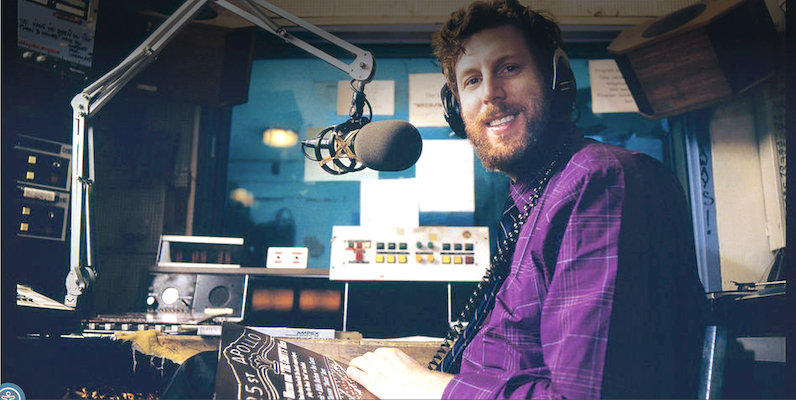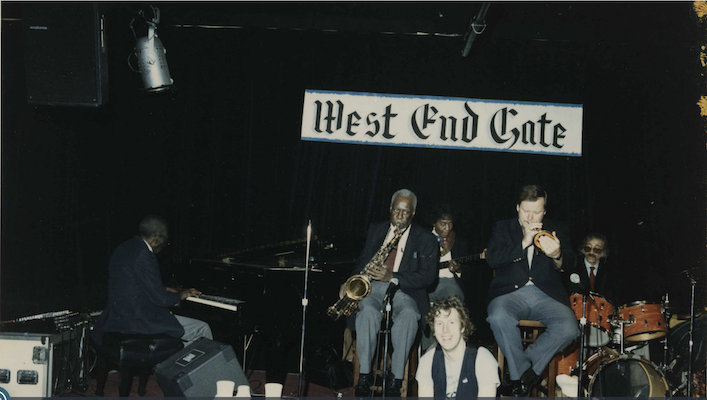A Mother Lode of Historical Jazz Recordings
Free for the Listening
Here’s a bit of listening advice from a trustworthy friend (that friend would be Yr. Mst. Hmbl. Scribe).
Please just drop whatever you are listening to, and click over to this gem, from a treasure trove of thousands of historical jazz recordings that were made between 1970 and 2021. That pinpoint link lands on the page for a digitized 1977 set of “studio live” reel-to-reel, unedited recordings of trumpeter Doc Cheatham (1905 – 1997) and friends. I love listening to raw session recordings where you can hear the slatings and the re-takes and the occasional chatter. (A link to everything that has been digitized so far, is here.)
By the way, the photo on that item page (and which is reproduced above) appears to show the young Phil Schaap making a recording at the New York City jazz club “West End Gate.” If you look carefully, you can make out the microphones.
But I do not believe that that photo shows Doc Cheatham. Also, the recording venue for the particular reels on that page is not specified. The fact that there are re-takes on those tapes indicates to me that that was work-in-progress for a hoped-for commercial release, rather than a recording of a public live performance. All that said, whoever it shows, it’s an evocative in-period photo.
Adolphus Anthony Cheatham was born in Nashville, Tennessee, of African, Cherokee, and Choctaw heritage. His nickname came about because his parents harbored dreams of his becoming a pharmacist. The nickname stuck.
As one might imagine, there wasn’t much jazz in Nashville before WWI. However, there were recordings, and they inspired a career-path change. From age 15 on, Cheatham studied music, playing cornet, trumpet, saxophone, and drums. In 1924, he moved to Chicago, where King Oliver’s playing was a revelation to him. Doc followed Oliver around, and Oliver gave to his young musician fan a mute for his trumpet. Based upon Cheatham’s later accomplishments, I am quite certain that King Oliver’s gesture was not a backhanded insult. Cheatham cherished that mute; he used it for the rest of his long and productive life.
It's remarkable that those NYC-area tapes ended up in Nashville, of all places… Cheatham’s birthplace. That’s because those tapes were recorded by, for the lack of a better term, jazz Factotum (“He does it all”), Phil Schaap (1951 – 2021). And Schaap’s mind-blowing jazz archives (details below) were recently donated to Vanderbilt University.
Schaap’s parents were jazz enthusiasts. Indeed, his father was a jazz scholar, historian, translator, and discographer. Phil Schaap entered Columbia University as a History major, and soon found a perch at Columbia’s student-run radio station WKCR, broadcasting as a disc jockey and later, jazz historian and interviewer from early 1970 on, for 50 years.
Obviously a “Take-Charge” individual, Schaap soon was running a live-performance jazz series at the bar across the street from the Columbia radio station’s studio. His aim was to provide under-appreciated (and, in cases, unemployed) swing-era musicians with “a nice last chapter of their lives.” He later said it was one of his proudest achievements.
You’ll have to read Schaap’s Wikipedia entry to get the full measure of the man. But it must be noted that he taught jazz at the graduate level at Columbia University and Rutgers University, taught American Studies at Princeton University, and convened graduate-level classes for the Juilliard School’s “Jazz at Lincoln Center” program.
Equally impressive to me is that Schaap was his own recording engineer. (He also engineered live sound for George Wein’s Newport Jazz Festival.)
During his life’s journey, Phil Schaap acquired seven “Little Gold Gramophones.” (My personal count: Zero.) Three for “Best Album Notes;” three for “Best Historical Recording;” and one for “Best Audio Engineering.” That last one being the 1996 award for Miles Davis & Gil Evans: The Complete Columbia Studio Recordings. Obviously, this guy knew his stuff.

The fact that it took two 18-wheel trucks and a van to get the Phil Schaap Collection to Nashville gives some idea of its depth and breadth:
2,100 taped in-depth interviews with jazz musicians;
2,000 tapes of Schaap’s long-running Charlie Parker radio show called Bird Flight*;
(TBD) audio recordings of live shows from the West End Gate;
10,000 78rpm phonorecords;
10,000 LP phonorecords;
3,000 45rpm phonorecords; and
2,000 Digital Audio Compact Discs.
As you can surmise from hitting the “Back to Phil Schaap Jazz Collection” button (“<”) in the upper left-hand corner of the linked-to web page, the digitization of this collection is already under way. Financial support for the digitization came from a New York-based private charitable foundation with directors who are big fans of Phil Schaap.
If you would like to make a tax-deductible
donation to help defray the costs of preserving
Phil Schaap's musical legacy, please click here.
Footnote:
*Charlie Parker’s “Emergency Backup” nickname of “Bird” was a short version of his Regular nickname “Yardbird.” That longer nickname was later borrowed by the British Blues band “The Yardbirds,” out of admiration for Parker’s improvisatory skills. The Yardbirds were the band that launched the careers of guitarists Eric Clapton, Jeff Beck, and Jimmy Page.
Years ago, I read, in a then-much-older issue of Esquire magazine, that Parker’s nicknames came about because a band tour bus that Parker was riding in had struck and killed a wandering chicken.
Parker vociferously insisted that the driver turn around and go back, so that Parker could pick up the dead bird, intending to cook the roadkill later. Parker’s bandmates found such parsimony… utterly risible. Therefore, they conferred upon him the sobriquet “Yardbird.” Lest he (or anyone else) forget.
# # #







































.png)








